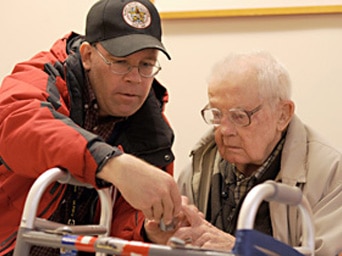A special group of Veterans gather at VA Pittsburgh Healthcare System (VAPHS) once a month for guidance on handling vision loss and updates on services available from both VA Pittsburgh and the community. They are part of the active and growing VAPHS Visual Impairment Services Team (VIST) Support Group.
Helen M. Trent, LSW, a physical medicine and rehabilitation social worker, leads the group.
Support group members have input on activities, suggesting speaker topics and programs for visually-challenged Veterans. “They have gone on boat rides, and they have also done peer-to-peer presentations,” says Trent. Presentations and lively question-and-answer sessions provide many new insights for Veterans.
Trent and group members want to invite all sight-challenged Veterans to join them on the second Friday of each month at 10 a.m.
Army Veteran Paul Stinner, 89, a World War II paratrooper from Robinson Township, agrees.
“I get to meet a lot of people in the same boat as I am,” Stinner says. “I also hear if there is something new going on in the VA and the community. More Vets with vision problems should avail themselves of this opportunity, because you learn what is going on.”
Trent and her fellow blind and low vision staff see their work as a calling.
“Our mission is to help Veterans adjust to their vision loss and help them cope by supporting their overall healthy wellbeing and also support their caregivers,” said Trent.
VAPHS Optometrist Dr. Lindsey Lear treats most of these Veterans and knows first-hand that the loss of sight necessitates having a support group.
“So many of these Vets have adjustment issues, and it can be hard mentally to deal with the loss on their own,” said Lear. “The support group gives them a voice, as well as an opportunity to be around others sharing their struggle.”
“It’s a real social function for him,” explains Pamela Francis, caregiver of a visually-impaired Veteran. “He doesn’t feel comfortable going to a lot of places. This is a safe place for him.”
Veterans who wish to learn more about the VIST Support Group can call Helen Trent at 412-360-6857.
ATTENTION READERS
We See The World From All Sides and Want YOU To Be Fully InformedIn fact, intentional disinformation is a disgraceful scourge in media today. So to assuage any possible errant incorrect information posted herein, we strongly encourage you to seek corroboration from other non-VT sources before forming an educated opinion.
About VT - Policies & Disclosures - Comment Policy




